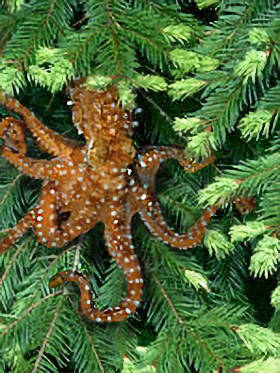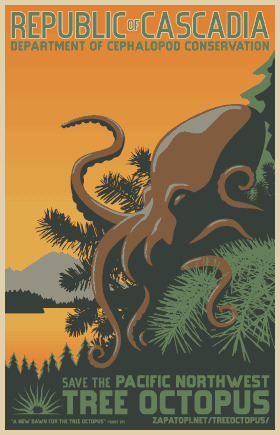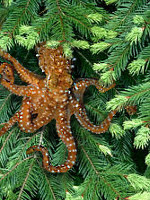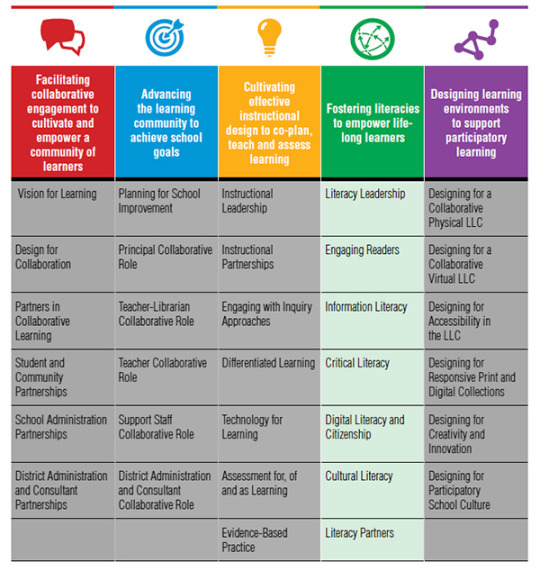#pacific northwest tree octopus
Text
Today I want to talk about the Pacific Northwest Tree Octopus (Octopus paxarbolis).


OK, so for those who don't know, the PNW Tree Octopus was an internet hoax created in 1998 consisting of a website detailing the animal's life history and conservation efforts. It's completely fake - saying that up front. This animal never existed.
But if you look at this from a speculative biology standpoint? It's genius.
There is one, and only one, thing preventing Octopus from colonizing and being hugely successful in terrestrial environments in the PNW, and that's the fact that no cephalopod has ever been able to overcome the osmotic stress of inhabiting freshwater. We don't know why this is; other mollusks evolved freshwater forms just fine. But if you hand-wave away that one, single limiting factor, the PNW is just primed for a terrestrial octopus invasion.
The Pacific coast of North America is an active tectonic boundary, meaning the coast transitions pretty much immediately into the Cascade and Coastal mountain ranges (contrast with the east coast and its broad Atlantic plain). It's also a lush temperate rainforest, with very high precipitation. This means lots and lots of high-gradient mountain streams with lots of waterfalls and rapids and cold, highly oxygenated water, and not as many large, meandering rivers.
This has important consequences on the freshwater fauna. For one, there are not many freshwater fish in the Pacific Northwest - the rapids and waterfalls are extremely hard to traverse, so many mountain streams are fish-free. There also just isn't much fish diversity in the first place - there's sturgeon in the big rivers, salmonids, a few sculpin and cyprinids and... that's pretty much it. These cold northern rivers are positively impoverished compared to the thriving fish communities of the Mississippi or Rio Grande.
Few fish means few predators, and depending on the size of the first freshwater octopus, salmon and trout just wouldn't be much of a threat. And while these rivers don't have much in the way of fish diversity, there's lots of prey available - crayfish, leeches, mosquito larvae, frogs and tadpoles, water striders, and other aquatic insects, just to name a few. So the first Octopus pioneers to invade the rivers would be entering what essentially amounts to a predator-free environment with lots and lots of food and no competition. Great for colonization.
These ideal conditions get even better once you get up past the rapids and waterfalls, since there's no fish whatsoever in those streams. Octopus, with their sucker-lined arms, are perfectly equipped to navigate fast-moving, rocky-bedded streams and climb up cliffs. They'd also be well able to traverse short stretches of dry ground to access even more isolated pools and ponds. In fact, once Octopus overcome the osmoregulation problem there's nothing at all preventing them from colonizing land in earnest, since the PNW rainforests are so wet; there's no danger of drying out.
Finally there's the question of reproduction. Octopus are famously attentive mothers, because they need to keep the water around their eggs moving and well-oxygenated. In a mountain stream, this wouldn't be an issue, because the cold, turbulent water holds lots and lots of oxygen. Breeding in high mountain streams would be ideal, and the mothers might not even need to attend to their eggs, freeing them up to evolve away from semelparity and allowing them to reproduce more than once in their lives; their populations would thus increase rapidly and dramatically.
I think, if octopus managed to invade freshwater ecosystems in the PNW, it would dramatically change the ecology much like an invasive species. They'd be unstoppable predators of frogs, bugs, slugs, maybe even larger animals like snakes, birds, and small mammals. Nothing would eat them except maybe herons, and things like bears and raccoons would give them a wide berth due to their venom. They would rule that landscape.
The tl;dr is that the PNW is primed for invasion by cephalopods, if only they could manage to overcome the osmoregulation problem and live in freshwater. If the Pacific Northwest Tree Octopus really did exist, it wouldn't be a shy and reclusive species on the brink of extinction; it would be a pest, an invasive, overpopulated menace you couldn't get rid of if you wanted to. I can just imagine them crawling up onto people's bird feeders and either stealing the nuts or luring in unsuspecting sparrows and starlings. They would sit in the trees and throw pinecones at hikers for fun. They would be some unholy mixture of snake and slug with the personality of a magpie and I am incensed that they only exist in fiction.
#long post#octopus#speculative biology#speculative evolution#spec bio#spec evo#pacific northwest#pacific northwest tree octopus#truly a shame that there are no freshwater or terrestrial cephalopods
294 notes
·
View notes
Text

Hoax of the Day: Tree Octopus
Description: You hear something swinging from the trees above you, what could it be? Birds? Squirrels? Or the Pacific Northwest Tree Octopus! No, it’s probably a bird. This internet hoax was created by Lyle Zapato in 1998, and claimed the Washington State Olympic Park was its home.
89 notes
·
View notes
Note
scale of one-to-ten, how do you rate the pacific northwest tree octopus?

for research porpoises
... those don't even exist.
5/10. The concept is weird but funny. I prefer octopus in my soup tbh.
11 notes
·
View notes
Text
I think us Splatoon fans should be more forward in advocating conservation of the Pacific Northwest tree octopus
88 notes
·
View notes
Note
Weird Asks
which cryptid being do you believe in?
are you farsighted or nearsighted?
a scenario that you’ve replayed multiple times?
which cryptid being do you believe in?
I don't, generally, but coming from the PNW, gotta say the closest I come to believing in a cryptid is Sasquatch. Although this is my favorite: Pacific Northwest Tree Octopus (more of an internet hoax than an actual cryptid)
are you farsighted or nearsighted?
Nearsighted with an astigmatism.
a scenario that you’ve replayed multiple times?
like in a game? I dunno, like all of Stardew Valley multiple times. Managed to play several D&D scenarios multiple times with different groups because there are definitely some popular one-shots out there (looking at you, intro scenario for Curse of Strahd).
weirder asks
2 notes
·
View notes
Text
do you guys know about the pacific northwest tree octopus
14 notes
·
View notes
Text
There are a lot of shitty things going on in the world but on the bright side we did manage to save the Pacific Northwest Tree Octopus.
5 notes
·
View notes
Quote
楽しみを台無しにするつもりはありません。これが趣旨に沿わない場合は反対票を投じてください。しかし、私はこれを理解するのに時間がかかりすぎたので、他の人は私と同じくらい遅いかもしれませんが、このコメントを読むことで時間を節約できます。 > 太平洋岸北西部の木ダコは、ライル・ザパトというペンネームのユーモア作家によって 1998 年に作成されたインターネットのデマです。 Pacific Northwest Tree octopus の Web サイトは、その作成以来、学校のインターネット リテラシーの授業で一般的に参照されており、オンライン情報源に対する子供たちのだまされやすさを示す複数の研究でも使用されています。 [1] [1]: https://en.wikipedia.org/wiki/Pacific_Northwest_tree_octopus
太平洋岸北西部の木ダコ | 写真 ハッカーニュース
2 notes
·
View notes
Note
Sorry got too excited and forgot to put in my noms:
Octodad
Ursula
Ursula’s sister Morgana
Pacific Northwest Tree Octopus
Squidward Q Tentacles, who is by word of god an octopus
This lil guy of course 🐙
Giant Octopus from Mega Shark vs Giant Octopus
The two octopi in the aquarium (Seattle I think?) who displayed complex cooperative problem solving to take down the barrier between their tanks so that they could fight to the death
Henry the Hexapus
giant Pacific octopus (Enteroctopus dofleini)
This vase https://en.m.wikipedia.org/wiki/Octopus#/media/File%3AAMI_-_Oktopusvase.jpg
Sure I’m forgetting many but here’s a start
wow!! thanks for the submissions!! Morgana (The Little Mermaid 2), the Pacific Northwest Tree Octopus (Cryptid), the octopus emoji [🐙] (Emoji), Giant Octopus (Mega Shark vs Giant Octopus), the 2 octopi from the Seattle (?) aquarium that fought to the death, Henry the Hexapus, and the Oktopus Vase have been entered! Octodad, Squidward, and Ursula have already been submitted, ,
also someone please inform me about the death fight octopi in excruciating detail
5 notes
·
View notes
Text
Funny how none yall ever care about the endangerment of the Pacific Northwest tree octopus
3 notes
·
View notes
Text
would snorpy believe in the pacific northwest tree octopus
5 notes
·
View notes
Note
I have no idea if this really counts but my favorite cryptid-ish(?) fake creature is this thing called the Pacific Northwest Tree Octopus. It's not something that anyone had any sightings of, though, it's an entirely made-up creature with a website dedicated to "saving" it.
https://zapatopi.net/treeoctopus/
It became a huge inside joke in my friend group after we had a class in elementary school using the website to teach us about misinformation on the internet. (I think it even inspired one of my friends to make a website for a fake creature of their own, but I can't remember what the website was or if it's still up)
id say it counts! answer ive never heard before but I love that. the detail of the website too?? incredible
great answer^^ bonus points for it being an octopus, because I am deeply deeply biased.
#gently sticking a gold star sticker to your shirt. :)#asks#👞#also this reminds me of the whole drop bear thing which is is even better
3 notes
·
View notes
Text
In the reverse Celestial Harmonies au, the place isn’t a new Eden, but the park is so bizarre with its plants and wildlife.
Crowley set up shop here ages ago and because of their unconscious influence on the location, plants are varied and very different from what you’d actually find in the region. Animals are oddly attracted to the place and that includes cryptids.
If you look hard enough, you’ll find all sorts of strange creatures living in the woods. Mutant deer, a mothman or two, the Pacific Northwest Tree Octopus (please look this one up, it’s fantastic), Bigfoots, giant black cats and dogs, all sorts flock to this place because of Crowley.
Also, national parks are just weird like this anyway, so... it might not all be Crowley’s influences.
3 notes
·
View notes
Note
Had a computer science class in middle school and the very first thing the teacher did, was lie to us bold face. And at the end of the day shocked us with teaching us that, guess what, learn to think about things and not take everything you read online at face value. We then worked the rest of the week on how to verify information and at the same time, the English teachers, instead of launching us into reading something straight away, started us off with understanding context clues. Yeah sure the curtain is blue because it's blue but ignore that and focus on what matters in the text.
I think about that a lot. They single handily had more direct positive influence on my life than every other teacher I have ever had.
and that's how it should be done!!! i had something similar, something about a tree octopus. one second
this thing ^^ i remember it very vividly. fourth grade. our teachers shoved all like 8 of us into the computer lab and told us to go on this site. and they didn't tell us it was fake. they let us piece the inconsistencies together on our own, and when we started to realize something was wrong, went into depth about how to tell when sources are reliable, and to not believe everything you read at face-value. thing was, this happened in the "gifted student" program (which i loving call my autism program, bc thinking back, all of us were DEFINTELY just undiagnosed autistics). my classmates never got this teaching in their classes. all they got was "dont use wikipedia lol" and were just expected to know how to find reliable sources. i think about that a lot.
#muse talk#anon#this turned into a personal tangent#but whenever i see a young kind. whos clearly just reciting information theyve been told second-hand#or found offhandedly#i wonder if theyve ever been taught otherwise. taught better.#im glad you had a good computer teacher anon :) that makes me hopeful to hear other schools may be doing it. and mine was just an exception
4 notes
·
View notes
Text
Critical Literacy in Accessing Internet Reference Resources
Teaching critical literacy skills is a top priority for a teacher librarian. “Fostering literacies to empower life-long learners” is one of the five themes in the Leading Learning Framework (page 10), and half of the bullet points in that theme are about critical literacy. In my experience this can be challenging stuff to teach for elementary students, who use the internet all the time, but aren’t very good at it.

Different strategies are needed depending on the age of the students. As with most things, it’s going to be easier to lay the groundwork for primary students by starting offline rather than on Google. “Understanding what they’ve read and making it their own” seems to me to be enough of a learning goal to keep students busy for most of their primary years. This can be done through reading response, writing activities, or research, and all of these are valuable, curriculum-supported areas of study. But at least as far as critical literacy is concerned, I think it’s very important that the research aspect be given special attention. For another course we read a paper by Daniel Willingham which made the case that critical thinking skills don’t transfer well between disciplines. So how much the ability to hear a story and then summarize it in your own words transfers to reading a book or a website and then recording facts from it is an open question. If research skills are the goal, that’s what needs to be taught and practiced.
For both primary students and intermediate students, whether they are using books or the internet as their source, I would set up a series of small, stand-alone activities for them to practice the skills of finding answers to questions and then rephrasing the material into their own words, recording facts in note form and then turning those notes back into sentences or into some other format (diagrams, pictures, infographics, etc.). These activities could be done in collaboration with classroom teachers, but most importantly, they ought to be done shortly before a class does any sufficiently sized research project in class. Communication with classroom teachers early in the year is key, in order to know those teachers’ plans and how best to schedule around them. Using library prep time to support classroom teachers in this way fulfills the core themes of the teacher librarian position, justifies this time to other staff, and sets students up for success going forward.
For intermediate students, we can incorporate additional goals as well. To note-taking skills I would also add internet searching skills (how to use keyword searches in search engines as well as in district-curated online resources, how to sift through the results to find likely useful resources, judging author intent, etc.) and media literacy in weighing the validity of a source (including cross-referencing and checking for citations or author info). As with note-taking skills, I think the best way to approach these topics is in isolation first, teaching them explicitly with short, focused activities, before immediately putting them to use in more authentic learning activities such as research projects. I’ve been the classroom teacher trying to fit in basic Google skills or a visit to the Pacific Northwest Tree Octopus page or kidsboostimmunity.com before jumping into research projects, and I know how much I would appreciate having another teacher who can take on some of that important work and give it the time that it deserves.

Resources used
Canadian Library Association (2014) Leading Learning: Standards of Practice for School Library Learning Commons in Canada 2014.
Public Health Association of BC. “Kids Boost Immunity.” 2024. https://kidsboostimmunity.com
Willingham, Daniel. T. (2019). How to Teach Critical Thinking. Education: Future Frontiers: Occasional Paper Series. New South Wales Department of Education.
Zapato, L. “Help Save the Endangered Pacific Northwest Tree Octopus from Extinction!” 1998-2022. https://zapatopi.net/treeoctopus/
1 note
·
View note
Text
Remember kids, if you see a Pacific Northwest tree octopus, you're probably in the Pacific Northwest.
1 note
·
View note